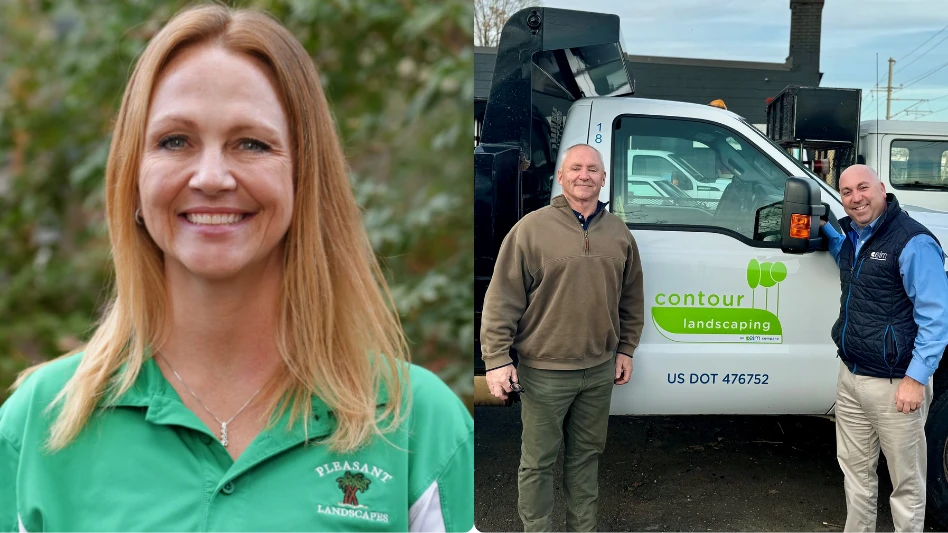It’s no secret irrigation contractors have hailed the maintenance side of the industry as an increasingly profitable service opportunity. It can generate additional revenue, provide annual renewable contracts, initiate more jobs for the construction department with system upgrades, and provide a reliable cash flow with service work being billed daily.
But exactly how profitable is this service, especially in this deflated economy? And what steps does it take for a contractor to add this type of service to its irrigation mix?
Some contractors see irrigation maintenance as a nuisance or something merely to dabble in when there’s spare time.
This is not the case for others, who see it as a significant component of their businesses. Lawn & Landscape spoke to contractors who offer this service. Here they share their insights on how maintenance is keeping them afloat this year.
FEAST OR FAMINE. Chuck Biffar, owner of Turfbuilders Irrigation in Omaha, Neb., says when it comes to irrigation systems, he hasn’t felt the recession’s sting.
Since 1980, he has been installing systems and servicing them for commercial and residential clients. With a full-time staff of 15 year-round, and seasonal employees as needed, the company does 90 percent irrigation. Of this, maintenance makes up 30 percent with installation making up the remaining 70 percent.
Irrigation maintenance isn’t a new concept for Turfbuilders. From the beginning, it has serviced everything it installed. Yet it wasn’t until some 12 years ago that Biffar began emphasizing his service department. “Even during times of slow installation, people still need service,” he says. “It helps with cash flow because we know we have money coming in.”
It only makes sense to provide maintenance for your irrigation clientele, he explains. Everybody needs their systems turned on in spring, and they need them winterized before the harsh weather sets in. On the service side, percentage-wise his customer base is split down the middle between residential and commercial.
Business is feast or famine, Biffar says. “During the first few hot days of the year everyone wants their systems turned on at once, and we can field 300 calls a day.”
To help control this scenario, the company tries to educate residential customers so they can do basic sprinkler start-ups themselves, he adds. Not only does it make the incoming calls more manageable, but homeowners typically don’t want to spend extra money to have a service man perform these tasks.
His commercial customers sign annual contracts for monthly inspections. “These are a good source of guaranteed revenue, and a good budget item for commercial customers. We haven’t seen a drop in service revenue this year,” says Biffar. In fact, the service department is netting higher than the rest of the business. He is seeing a 10 percent annual growth in this sector, which he regards as adequate.
LUCRATIVE & LOVING IT. And if the recession has hit Fort Worth, Texas, Jeff Kauffman hasn’t batted an eye. At least not in 2008 – his best year yet, due to a mild drought. Conversely, the wet climate in 2007 took a toll on the business. “That year was the worst ever, because it rained for what seemed like two months, and it cost me about $200,000 in lost business,” he recalls.
As owner of Jake’s Lawn Care & Irrigation, Kauffman’s experience has been that, weather permitting, the service side is one of the most lucrative facets of the business. Established in 1988, the firm is primarily a lawn care company with 35 percent of its business in irrigation. Maintenance makes up 65 percent, while installations make up 35 percent. Jake’s Lawn Care & Irrigation has an annual revenue of approximately $2 million and employs between 25 and 34 full-time staff.
Although his company always did sprinkler repairs, it wasn’t until approximately 10 years into the business that it really started to promote the service side, Kauffman says. His clientele is 75 percent residential and 25 percent commercial. The revenue on the irrigation maintenance side is approximately $100,000.
Promoting maintenance was not a difficult sell. Rather, his customers have always wanted a diversified landscape contractor and appreciate the fact that they only need to make one phone call. “Our customers want someone who can come in, plant seasonal flowers, work on their sprinkler systems, change the clock when daylight savings time comes, and make sure things are top notch,” he says. “We’re perfectly capable of doing that.”
In fact, Kauffman estimates annual growth on the maintenance side to be between 5 and 10 percent in good years. He regards it as “crazy fast growth” that can be temporary, according to the climate.
To accommodate growth, Kauffman says he makes adjustments. For instance, he adds another man to reduce time on larger jobs or schedules an additional crew. Sometimes if the calls are too many, he might postpone installations.

THE MARGIN IS WHERE IT’S AT. When Chris Haase, vice president of Haase Landscape, added irrigation maintenance to his mix eight years ago, it was in response to his customers’ requests. “People liked what we installed and wanted us to maintain it,” he says. In fact, he was receiving service requests from people with systems installed by other companies.
Located in Spokane, Wash., the 26-year-old firm specializes in design/build and landscape maintenance, with 20 percent of business dedicated to irrigation. It has an annual revenue of approximately $2.3 million, of which 5 percent is irrigation maintenance and 20 percent is installation. Its staff ranges in size from eight full-time and 25 part-time workers in winter to 40 full-time in summer.
Haase’s company services residential and commercial clients, and each year has experienced a 10 percent growth on the irrigation side, which he deems adequate.
He says his gross profit margin in maintenance is between 43 and 45 percent – one of the highest, as it’s measured on a time and materials basis.
“In this economy irrigation maintenance is more important to the business because our commercial contracts all require irrigation system installation,” he notes.
And, so far this year for Haase, the installation side is just as busy.
The author is a freelance writer based in Lakewood, Ohio.
Latest from Lawn & Landscape
- LawnPro Partners acquires Ohio's Meehan’s Lawn Service
- Landscape Workshop acquires 2 companies in Florida
- How to use ChatGPT to enhance daily operations
- NCNLA names Oskey as executive vice president
- Wise and willing
- Case provides Metallica's James Hetfield his specially designed CTL
- Lend a hand
- What you missed this week





